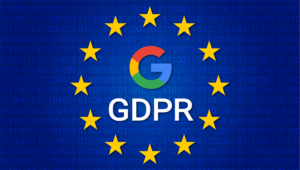Google is to make it easier for users to understand what data it collects on them and why ahead of EU regulators implementing the new General Data Protection Regulation (GDPR) on 25 May.
The firm hasn’t announced any sweeping changes to its data policies, instead like Facebook it’s seeking to improve “user transparency” by giving people more explicit tools to manage their own data.
In a blog post from William Malcolm, Google’s director of privacy and legal for EMEA, the internet giant marked a departure from its typically technical language to explain in the simplest of terms what the changes would mean for those who use its services, alongside video examples.
What is likely to be of interest to marketers is that the process of managing advertising preferences or muting certain ads entirely will be more streamlined for consumers, with Google saying it has plans to “further simplify the look and feel of these tools in the coming months.”
Malcolm  wrote to users: “We’ve improved the navigation and organisation of the policy to make it easier to find what you’re looking for; explained our practices in more detail and with clearer language; and added more detail about the options you have to manage, export, and delete data from our services.
wrote to users: “We’ve improved the navigation and organisation of the policy to make it easier to find what you’re looking for; explained our practices in more detail and with clearer language; and added more detail about the options you have to manage, export, and delete data from our services.
“The policy now also includes explanatory videos and illustrations, because a visual description can be easier to understand than text alone. And we’ve made it easier to jump to your privacy settings directly from the policy, helping you make choices about your privacy.”
Within ‘My Account’, the hub that brings together different ways users can review their data, privacy and security settings, it will be simpler for users to choose what activity is saved to their account and view or delete data.
As per GDPR stipulations around data portability, services like Google Photos will eventually allow users to seamlessly transfer data from that platform onto an alternative one.
Google is also rolling out a proposition called Family Link that will let parents create a Google Account for their kids and set “digital ground rules” on any Android device, like approving or blocking apps. This is so it complies with GDPR rules which require companies to get consent from parents to process their children’s data in certain circumstances.
The move to be more transparent with the public comes in the midst of a growing mistrust in digital platforms and in the aftermath of Facebook’s Cambridge Analytica fallout which has shone a spotlight on how the duopoly handle personal information.
move to be more transparent with the public comes in the midst of a growing mistrust in digital platforms and in the aftermath of Facebook’s Cambridge Analytica fallout which has shone a spotlight on how the duopoly handle personal information.
For publishers looking for any information or clarification on Google’s controversial GDPR DoubleClick policies, there was little information in the latest update.
However, Malcolm did reiterate previous statements, saying Google has “built a solution for publishers that want to show non-personalised ads, using only contextual information.”
The move from Google to be more transparent around data privacy issues follows on from the Information Commissioner’s Office (ICO), which will be responsible for implementing GDPR in the UK, announcing plans to launch a long-term public education campaign.
Running under the working name ‘Your Data Matters’, the cross-industry effort will seek to educate people on what the new rules mean for them.
Source: The Drum

You must be logged in to post a comment Login